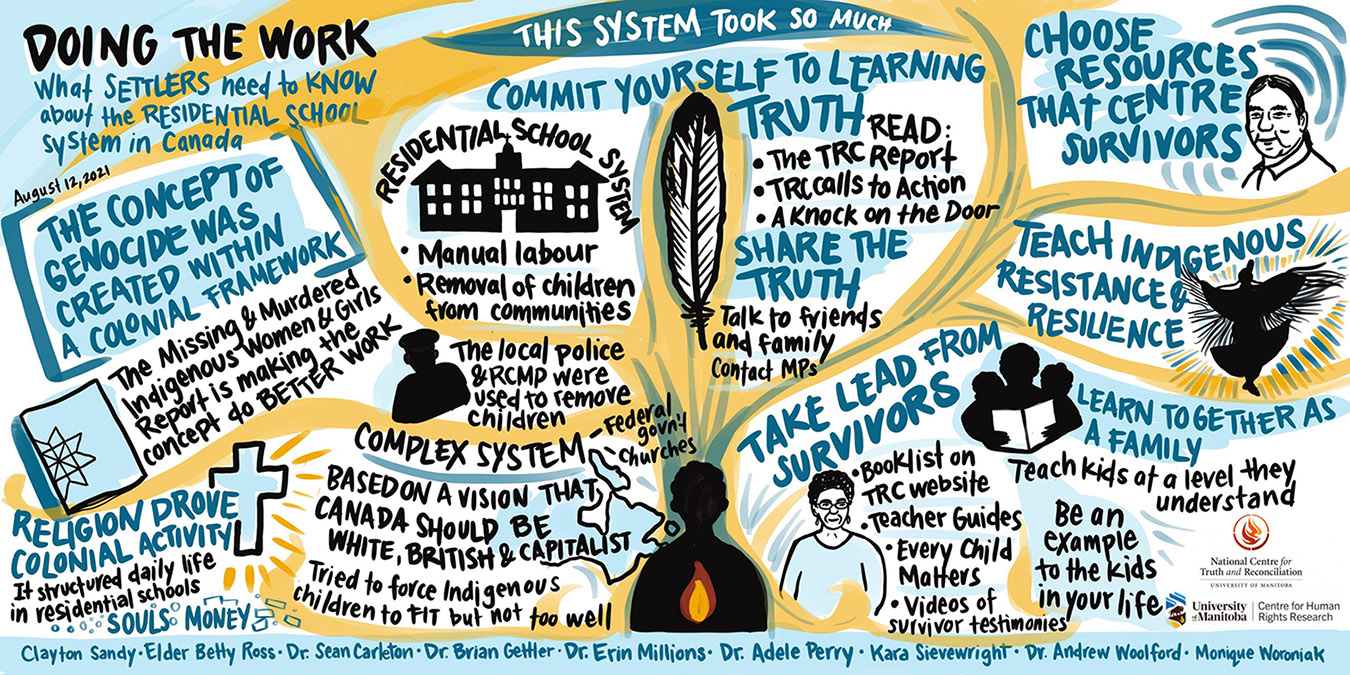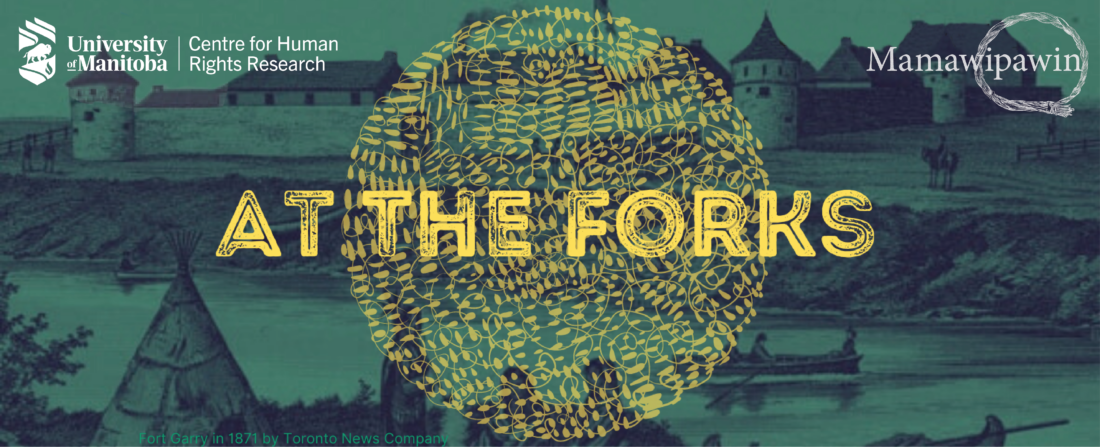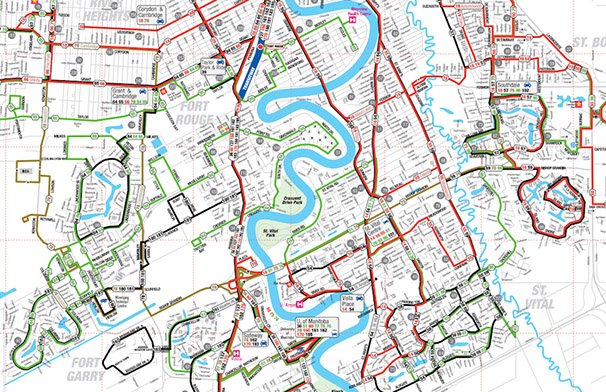The Constitution and the Declaration: Discussing Indigenous Rights with Dr. Patzer
August 18, 2021
Dr. Jeremy Patzer, Kayla Lariviere
The Centre for Human Rights Research (CHRR) presents “The Constitution and the Declaration: Discussing Indigenous Rights” with Dr. Jeremy Patzer.
Interviewed by Kayla Lariviere, CHRR/ISSIP Research Assistant, August 18, 2021.

Resource Hub
Doing the Work: What Settlers need to know about the Residential School System
August 12, 2021
Dr. Pauline Tennent
On Thursday, August 12th 2021, the Centre for Human Rights Research hosted “Doing the Work: A virtual Q & A on what settlers need to know about the residential school system in Canada.”This was a virtual Q&A session where our panel answered submitted questions and suggested available resources to help increase awareness and education about residential schools and the impact of colonialism in Canada.

Related Resources
Support Us
Whether you are passionate about interdisciplinary human rights research, social justice programming, or student training and mentorship, the University of Manitoba offers opportunities to support the opportunities most important to you.
Resource Hub
Doing the Work: What Settlers need to know about the Residential School System: A Guide for Settlers
August 12, 2021
Centre for Human Rights Research

On Thursday, August 12th 2021, the Centre for Human Rights Research hosted “Doing the Work: A virtual Q & A on what settlers need to know about the residential school system in Canada.” Following the event, the panel created a resource guide, intended as a living document, with information on residential schools and the impact of colonialism in Canada.
Related Resources
Support Us
Whether you are passionate about interdisciplinary human rights research, social justice programming, or student training and mentorship, the University of Manitoba offers opportunities to support the opportunities most important to you.
Doing the Work: Graphic Recording
August 12, 2021
Kara Sievewright, Centre for Human Rights Research

On Thursday, August 12th 2021, the Centre for Human Rights Research hosted “Doing the Work: A virtual Q & A on what settlers need to know about the residential school system in Canada.”This was a virtual Q&A session where our panel answered submitted questions and suggested available resources to help increase awareness and education about residential schools and the impact of colonialism in Canada.
Related Resources
Support Us
Whether you are passionate about interdisciplinary human rights research, social justice programming, or student training and mentorship, the University of Manitoba offers opportunities to support the opportunities most important to you.
Resource Hub
Doing the Work: What Settlers need to know about the Residential School System
August 12, 2021
Elder Betty Ross, Clayton Sandy, Dr. Sean Carleton, Dr. Brian Gettler, Dr. Erin Millions, Dr. Adele Perry, Dr. Andrew Woolford, Monique Woroniak
On Thursday, August 12th 2021, the Centre for Human Rights Research hosted “Doing the Work: A virtual Q & A on what settlers need to know about the residential school system in Canada.”This was a virtual Q&A session where our panel answered submitted questions and suggested available resources to help increase awareness and education about residential schools and the impact of colonialism in Canada.

At the Forks: Virtual Launch
June 25, 2021
Dr. Adele Perry, Dr. Kiera Ladner, Amy Jackson, Kayla Lariviere

The Centre for Human Rights Research (CHRR) presents: At the Forks: A Virtual Launch. ‘At the Forks’ is a project led by Dr. Adele Perry, Director of the Centre for Human Rights Research alongside Dr. Kiera Ladner and the Mamawipawin Centre for Indigenous Governance and Community-Based Research at the University of Manitoba. ‘At the Forks’ will feature accessible, open access writing that deals with the intersection of Indigenous and human rights in and around the prairies.

Pride Month - A Conversation with Dr Jocelyn Thorpe
June 22, 2021
Dr. Jocelyn Thorpe, Kayla Lariviere
The Centre for Human Rights Research (CHRR) presents: Pride Month — A Conversation with Dr. Jocelyn Thorpe. June 22, 2021

Resource Hub
The Right to Food and Community Gardens in Winnipeg: The Meadowood Victory Garden
June 2021
Laura Funk Fabiana Li
The COVID-19 pandemic caused disruptions in the food system that have sparked interest in growing food in home and community gardens. This research investigated the concept of “Victory Gardens” (food gardens popularized during wartime) as a response to the COVID-19 pandemic, using the Meadowood Victory Garden in Winnipeg as a case study. The research examined the potential of using the city’s green spaces, water and infrastructure to grow food for urban residents during the pandemic and beyond.

Resource Hub
Three UM Researchers to Examine more Equitable and Sustainable Public Transport Opportunities
June 7, 2021
UM Today Staff


Resource Hub
A screening of the David Suzuki Foundation’s LAND BACK
April 22, 2021
Aimée Craft, Danielle Morrison, Taylor Galvin
On April 22, 2021, The Centre for Human Rights Research (CHRR) presents: A screening of the David Suzuki Foundation’s LAND BACK. Panel dscussion featured Aimée Craft – Co-Producer, LAND BACK video series, Author, Associate Professor, University of Ottawa; Danielle Morrison – Lawyer, Narrator, University of Manitoba alumna; and Taylor Galvin – President, Indigenous Concerns on the Environment (UMICE). The LAND BACK video series consists of three videos. We welcome you to watch videos two and three in the series (PRESENT and FUTURE, respectively) on the David Suzuki Website.

Contact Us
We’d love to hear from you.
442 Robson Hall
University of Manitoba
Winnipeg, Manitoba
R3T 2N2 Canada
204-474-6453
Quick Links
Subscribe to our mailing list for periodic updates from the Centre for Human Rights Research, including human rights events listings and employment opportunities (Manitoba based and virtual).
Land Acknowledgement
The University of Manitoba campuses are located on original lands of Anishinaabeg, Ininew, Anisininew, Dakota and Dene peoples, and on the National Homeland of the Red River Métis.
Centre for Human Rights Research 2023© · Privacy Policy

